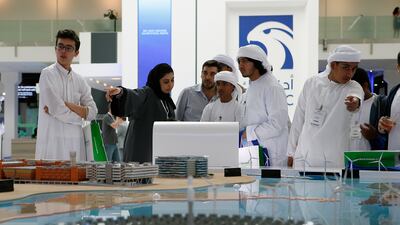The World Future Energy Summit will be take place in January in Abu Dhabi and address crucial topics such as sustainability and the role renewable sources can play in encouraging the shift to clean energy.
The event, which was held online in 2021 due to coronavirus-related restrictions, will take place at the Abu Dhabi National Exhibition Centre from January 17 to 19.
“The World Future Energy Summit is perfectly timed ... in the region, more countries have committed to building major infrastructure projects that significantly reduce [their] reliance on fossil fuels, with green hydrogen generation projects emerging as the crown jewel of these efforts,” said organisers.
The UAE and other countries around the region have formulated plans to introduce hydrogen into its energy mix and tap into the clean fuel’s potential.
State entities Adnoc, Mubadala and ADQ formed an alliance this year to develop a hydrogen economy in the UAE.
Adnoc subsequently announced plans to build a blue ammonia plant in Ruwais while Abu Dhabi Ports-owned Kizad said it would invest $1 billion in a green ammonia plant.
Ammonia allows for the easy transport of hydrogen, the blue form of which is derived from gas and the green version from renewable sources.
Plans are also under way in Oman to build a $30bn green hydrogen plant that will be the world's largest upon completion.
The plant is expected to reach full capacity in 2038, powered by 25 gigawatts of wind and solar energy.
Saudi Arabia, the world’s largest oil exporter, is also building one of the world's largest green hydrogen projects in Neom, the futuristic mega-city straddling the borders of Egypt and Jordan.
Saudi Arabia's Acwa Power and Air Products are building the $5bn project, which has a capacity of 4 gigawatts and can produce 650 tonnes of hydrogen a day.
A number of energy companies are expected to participate in the three-day event, including Abu Dhabi’s Taqa and France’s EDF and Engie.
"The world needs to make this a decade of deep decarbonisation, overcoming the urgent and complex challenge of transitioning to a clean-energy system,” said Ditlev Engel, chief executive of energy systems at DNV.
“The scale and pace required is framed by the Paris Agreement – limiting global warming to well below 2ºC, striving towards a limit of 1.5ºC above pre-industrial temperatures by the end of the century – but to achieve that, the right decisions have to be made today.”
Saudi Arabia became the second Gulf country, after the UAE, to unveil a net-zero emissions target earlier this week.
Bahrain, one of the smallest producers in the Gulf, also pledged to reach carbon neutrality by 2060 on Sunday.
The UAE, which unveiled plans to push for carbon neutrality by 2050 this month, said it plans to invest Dh600bn ($163.5bn) in clean and renewable energy sources in the next three decades.
The World Future Energy Summit is hosted by Masdar as part of Abu Dhabi Sustainability Week.


